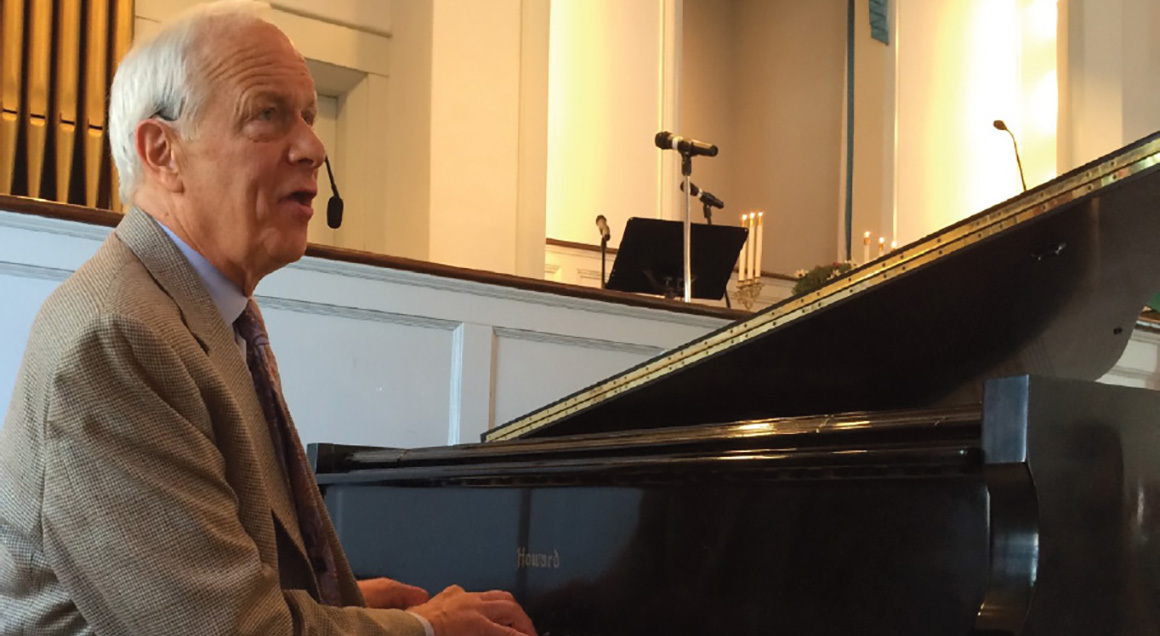History of Hymns: 'Lord, Listen to Your Children Praying'
By C. Michael Hawn

“Lord, Listen to Your Children Praying”
by Ken Medema
The Faith We Sing, 2193
Lord, listen to your children praying,
Lord, send your Spirit in this place;
Lord, listen to your children praying,
send us love, send us power, send us grace.*
*©1973 Hope Publishing Company, Carol Stream, IL 60188. Used by permission. All rights reserved.
Composing meaningful refrains is a specialized skill in the field of congregational song. A successful refrain should have several characteristics:
- It should be repeatable—worth singing several times.
- It should be memorable—can be learned by memory after only one or two repetitions.
- It should respond to the stanzas that lead into it—amplifying, summarizing, and completing each stanza in a few words.
- It may be able to stand on its own as a separate composition—a prayer response or acclamation of praise.
“Lord, Listen to Your Children Praying” admirably includes all these characteristics.
Ken Medema (b. 1943), one of the most versatile, creative, and enduring Christian artists today, has been composing and performing for more than fifty years.
Born in Grand Rapids, Michigan, Medema was visually impaired from birth, distinguishing only between light and darkness and able to perceive fuzzy outlines of larger objects.
For me, music made all the difference. I started banging on the piano when I was five years old, making up crazy little pieces on my mom's piano. When I was eight years old, my parents got me a wonderful teacher who taught me the classics with Braille music and encouraged me to play by ear. My teacher helped me to develop improvisational skills. Every time I learned a new piece, she would tell me, ‘Now you improvise in that style.’ So music became my second language. (Medema, https://kenmedema.com/about-ken-medema/)
Ken studied music therapy at Michigan State University in Lansing, focusing on performance in piano and voice. After returning to Michigan State for a master’s degree in music therapy, he served four years as a music therapist at Essex County Hospital in New Jersey. While employed in New Jersey, Medema began writing and performing his own music.
“Lord, Listen to Your Children Praying” was composed just as Medema began his performance career in 1973.
“Lord, Listen to Your Children Praying” came out of my New Jersey years. One night [in 1970], I was with a youth group. We started talking about a young man who was in the hospital and who really needed our prayers. In the middle of one prayer time. The idea for this little chorus came to me. I started humming, then singing. Soon the kids were mumbling along with me. We sang that chorus, “Lord, listen to your children praying,” several times over. Then I started adding verses, and the kids quickly joined me in singing the new words. So it was a song born out of our concern and prayer for a friend (Brink and Polman, 1998, p. 801).
Though they have their own energy, the three soloistic stanzas have not been maintained in hymnals. Stanza 1, provided here, reflects their revival spirit:
Something’s gonna happen like the world has never known,
when the people of the Lord get down to pray;
A door’s gonna swing open, and the walls come a-tumbling down,
when the people of the Lord get down to pray. (© Hope Publishing Co.)
The complete song with stanzas initially appeared as a choral octavo in 1973. It was recorded on the author/composer's album Son Shiny Day (1973). This recording is available at https://www.youtube.com/watch?v=BK3KJTyUqX0. The performance style is more upbeat in Medema’s recording than is usually performed now.
Though many passages mention the “children of God,” Romans 8:16 captures the essence of lines 1 and 3 of the refrain: “The Spirit himself testifies with our spirit that we are God’s children” (NIV). The second line echoes the well-known gospel hymn by Doris Akers (1922–1995), “There’s a sweet, sweet Spirit in this place” (1962). The final line—a series of petitions—draws on the benediction concluding 2 Corinthians (13:14): “May the grace of the Lord Jesus Christ, and the love of God, and the fellowship of the Holy Spirit be with you all” (NIV). While usable as a prayer response for any worship gathering, the stanzas and refrain are particularly appropriate for Pentecost.
In 1985, Ken Medema formed his own recording, publishing, and booking company, Briar Patch Music (Westermeyer, 2010, p. 615). He now performs around the world in a wide variety of venues ranging from corporate conventions and concerts to benefits and churches. He received an honorary doctorate from Huntington College (Illinois) in 1998.
SOURCES
Emily Brink and Bert Polman, eds., Psalter Hymnal Handbook (Grand Rapids: CRC Publications, 1998).
Carl P. Daw Jr., Glory to God: A Companion (Louisville: Westminster John Knox Press, 2016).
Ken Medema, Website: https://kenmedema.com/about-ken-medema (accessed July 2, 2022).
C. Michael Hawn, D.M.A., F.H.S., is University Distinguished Professor Emeritus of Church Music and Adjunct Professor, and Director, Doctor of Pastoral Music Program at Perkins School of Theology, Southern Methodist University.
Contact Us for Help
View staff by program area to ask for additional assistance.
